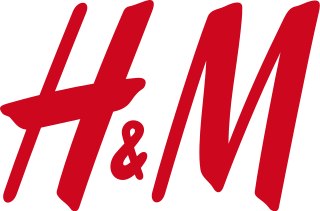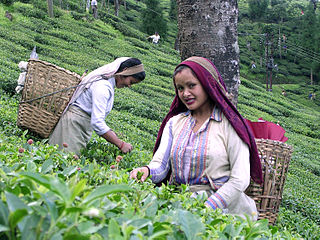Related Research Articles

The Economy of Bangladesh is characterised as a developing market economy. It is the 33rd largest in the world in nominal terms, and 31st largest by purchasing power parity. It is classified among the Next Eleven emerging market middle income economies and a frontier market. In the first quarter of 2019, Bangladesh's was the world's seventh fastest-growing economy with a rate of 8.3% real GDP annual growth. Dhaka and Chittagong are the principal financial centres of the country, being home to the Dhaka Stock Exchange and the Chittagong Stock Exchange. The financial sector of Bangladesh is the third largest in the Indian subcontinent. Bangladesh is one of the fastest growing economies in the world as well as the fastest growing economy in South Asia.

A sweatshop or sweat factory is a crowded workplace with very poor, socially unacceptable or illegal working conditions. Some illegal working conditions include poor ventilation, little to no breaks, inadequate work space, insufficient lighting, or uncomfortably high temperatures. The work may be difficult, tiresome, dangerous, climatically challenging or underpaid. Workers in sweatshops may work long hours with unfair wages, regardless of laws mandating overtime pay or a minimum wage; child labor laws may also be violated. Women make up 85 to 90% of sweatshop workers and would be forced by employers to take birth control and routine pregnancy tests to avoid supporting maternity leave or providing health benefits. The Fair Labor Association's "2006 Annual Public Report" inspected factories for FLA compliance in 18 countries including Bangladesh, El Salvador, Colombia, Guatemala, Malaysia, Thailand, Tunisia, Turkey, China, India, Vietnam, Honduras, Indonesia, Brazil, Mexico, and the US. The U.S. Department of Labor's "2015 Findings on the Worst Forms of Child Labor" found that "18 countries did not meet the International Labour Organization's recommendation for an adequate number of inspectors."

Hennes & Mauritz AB (H&M) is a Swedish multinational clothing company headquartered in Stockholm. It is known for its fast-fashion clothing for men, women, teenagers, and children. As of November 2019, H&M operates in 74 countries with over 5,000 stores under the various company brands, with 126,000 full-time equivalent positions. It is the second-largest global clothing retailer, behind Spain-based Inditex. Founded by Erling Persson and run by his son Stefan Persson and Helena Helmersson, the company makes its online shopping available in 33 countries.

The New York shirtwaist strike of 1909, also known as the Uprising of the 20,000, was a labour strike primarily involving Jewish women working in New York shirtwaist factories. It was the largest strike by female American workers up to that date. Led by Clara Lemlich and the International Ladies' Garment Workers' Union, and supported by the National Women's Trade Union League of America (NWTUL), the strike began in November 1909.

The International Labor Rights Forum (ILRF) is a nonprofit advocacy organization headquartered in Washington, D.C., U.S., that describes itself as "an advocate for and with the working poor around the world." ILRF, formerly the "International Labor Rights Education & Research Fund", was founded in 1986, and the organization's mission statement reads: "ILRF believes that all workers have the right to a safe working environment where they are treated with dignity and respect, and where they can organize freely to defend and promote their rights and interests. ILRF works to develop practical and effective tools to assist workers in winning enforcement of protections for their basic rights, and hold labor rights violators accountable."

The textile and clothing industries provide a single source of growth in Bangladesh's rapidly developing economy. Exports of textiles and garments are the principal source of foreign exchange earnings. By 2002 exports of textiles, clothing, and ready-made garments (RMG) accounted for 77% of Bangladesh's total merchandise exports.
Renana Jhabvala is an Indian social worker based in Ahmedabad, India, who has been active for decades in organising women into organisations and trade unions in India, and has been extensively involved in policy issues relating to poor women and the informal economy. She is best known for her long association with the Self-Employed Women's Association (SEWA), India, and for her writings on issues of women in the informal economy.

IndustriALL Global Union is a global union federation, founded in Copenhagen on 19 June 2012.

The 2013 Dhaka garment factory collapse was a structural failure that occurred on 24 April 2013 in the Savar Upazila of Dhaka District, Bangladesh, where an eight-story commercial building called Rana Plaza collapsed. The search for the dead ended on 13 May 2013 with a death toll of 1,134. Approximately 2,500 injured people were rescued from the building alive. It is considered the deadliest non-deliberate structural failure accident in modern human history and the deadliest garment-factory disaster in history.
The Accord on Fire and Building Safety in Bangladesh was signed on 15 May 2013. It is a five-year independent, legally binding Global Framework Agreement between global brands, retailers and trade unions designed to build a safe and healthy Bangladeshi Ready Made Garment (RMG) Industry. The agreement was created in the immediate aftermath of the Rana Plaza building collapse that led to the death of more than 1100 people and injured more than 2000. In June 2013, an implementation plan was agreed leading to the incorporation of the Bangladesh Accord Foundation in the Netherlands in October 2013.

Export-oriented employment refers to employment in multinational corporations' international industrial factories, usually located in developing countries. Such factories produce goods and services for sale in other countries. While these multinational producers have globally expanded women's access to employment, evidence suggests they do so by reinforcing traditional gender roles or creating new gender inequalities. Such gender inequities allow multinational firms to greater exploit profits per worker than they would otherwise due to the decreased labor cost. This decrease in the cost of labor comes as a result of the relegation of women to certain occupations. Studies show that in the quest for lower unit labor costs, export-oriented facilities create poor working conditions.

The Machinists is a 2012 British documentary film directed by Hannan Majid and Richard York. The film documents the exploitation of garment workers in Bangladesh with the personal stories of three young women working in factories in Dhaka.
Maria Eitel is the founder and Chair of the Nike Foundation, which supports the work of The Girl Effect, of which she is the founder and Chair.

Kalpona Akter is a labour activist from Bangladesh. She is the founder and executive director of the Bangladesh Center for Workers Solidarity and was awarded Human Rights Watch's Alison Des Forges award for Extraordinary Activism in 2016.
The Bangladesh Garment Workers Trade Union Centre (GWTUC) is a trade union federation of garment workers in Bangladesh. It is one of the largest trade unions in that sector, with more than 20 factory trade unions affiliated to it. It has enough members to be formally recognised as a trade union, but does not have that status, as is not uncommon for left-oriented unions in Bangladesh. Politically, GWTUC is aligned with the Communist Party of Bangladesh.
The National Garment Workers Federation (NGWF) is a registered national trade union federation of garment workers in Bangladesh. With 87 registered factory unions, it ifs considered one of the four main federations of garment workers' unions. NGWF is the initiator and a member of the Bangladesh Garments Workers Unity Council and a member of the Bangladesh Center for Workers' Solidarity. It is affiliated with the IndustriALL Global Union and one of the signatories of the Bangladesh Accord.
The Bangladesh Independent Garment Workers Union Federation (BIGUF) is a trade union federation of garment workers in Bangladesh. It is considered one of the four main federations of garment workers' unions. BIGUF is affiliated with the IndustriALL Global Union and a member organisation of the Bangladesh Center for Workers Solidarity. It is also one of the signatories of the Bangladesh Accord. Unlike many other trade unions in Bangladesh, it is explicitly not affiliated with any political party.
The Bangladesh Institute of Labour Studies (BILS) is a think tank for trade union activity and other labour matters in Bangladesh. It was founded in 1995 to support the building of trade unions and their activities and to promote trade union causes within government and society. Today, 12 Bangladeshi trade union federations are affiliated with BILS. Unlike many other labour organisations in Bangladesh, the institute is not affiliated with any political party. The institute publishes a biannual journal, Labour.
Morium Akter is the current general secretary of the Bangladesh Independent Garment Workers Union Federation (BIGUF), one of the largest trade union federations of garment workers in Bangladesh. She is also the vice president of the Bangladesh Textile and Garments Workers League.
Mushrefa Mishu is a Bangladeshi trade unionist and politician. She is the current president of the Garment Workers Unity Forum and general secretary of Bangladesh's Democratic Revolutionary Party.
References
- 1 2 Ayliffe, Daisy. "May Day: meet the Bangladeshi women leading a revolution". Channel 4 News. Retrieved 2016-12-08.
- ↑ "History & Background". awaj.info. Archived from the original on 2016-12-07. Retrieved 2016-12-08.
- ↑ "Conversation: Nazma Akter". World Policy Institute. Archived from the original on 20 December 2016. Retrieved 10 December 2016.
- ↑ Young, Holly. "'Without stronger unions, Rana Plaza will happen time and time again'". The Guardian. Retrieved 10 December 2016.
- ↑ "Nazma Akter". Global Leaders Summit Series. Archived from the original on 20 December 2016. Retrieved 10 December 2016.